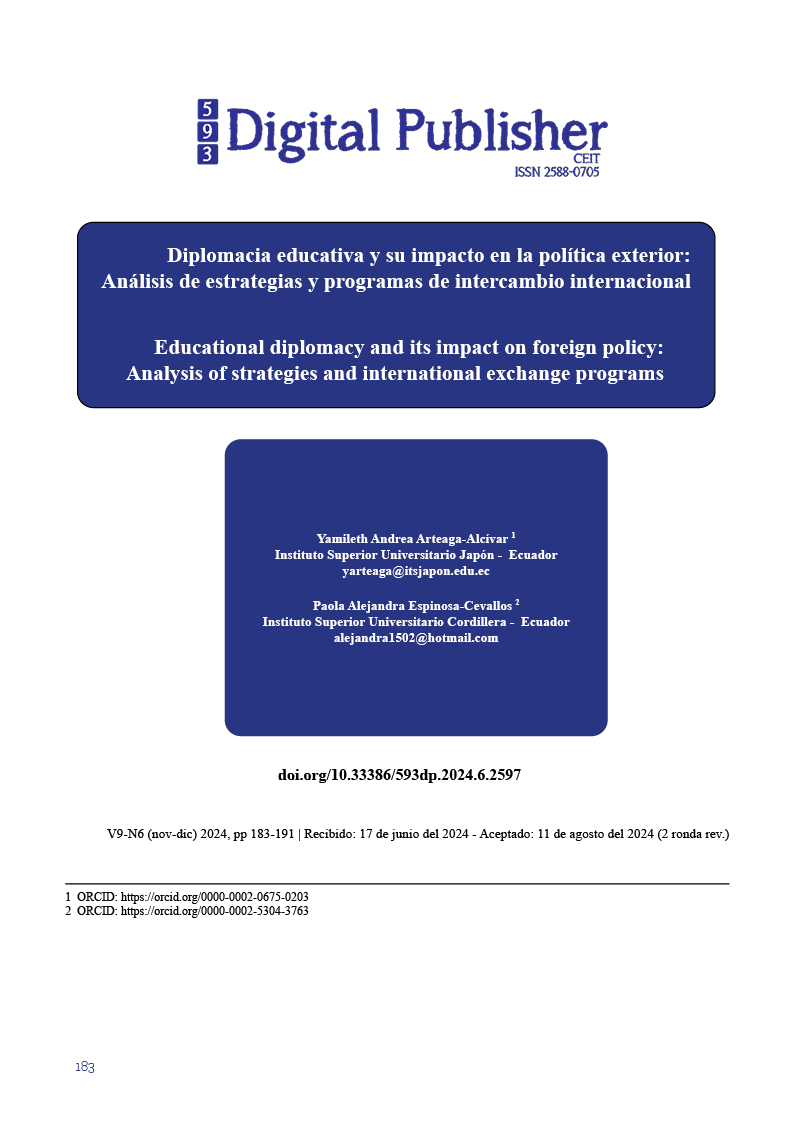Educational diplomacy and its impact on foreign policy: Analysis of strategies and international exchange programs
Main Article Content
Abstract
The general objective of this study was to analyze educational diplomacy and its impact on foreign policy, with a particular focus on international exchange strategies and programs. The methodology used included an exhaustive review of the specialized literature on the subject, with a comparative analysis of different countries and international organizations. The main results show that educational diplomacy has become an increasingly important instrument in countries' foreign policy, with a wide range of programmes and strategies aimed at promoting international academic and cultural cooperation. Among the most outstanding programmes are the Erasmus+ Programme, the UEx_QUERCUS+ Programme, and the "talent opportunity" Scholarship Programme, which offer students the opportunity for academic exchanges, practices and other training activities in universities around the world. Educational diplomacy aims to boost job prospects and personal development, in addition to helping education systems, training and youth to provide teaching and learning that equips people with the skills necessary for the labour market and the current and future society. The results also show that educational diplomacy can contribute to the promotion of intercultural understanding, the promotion of peace and international cooperation, and the development of key skills and competences for the 21st century.
Downloads
Article Details

This work is licensed under a Creative Commons Attribution-NonCommercial-ShareAlike 4.0 International License.
1. Derechos de autor
Las obras que se publican en 593 Digital Publisher CEIT están sujetas a los siguientes términos:
1.1. 593 Digital Publisher CEIT, conserva los derechos patrimoniales (copyright) de las obras publicadas, favorece y permite la reutilización de las mismas bajo la licencia Licencia Creative Commons 4.0 de Reconocimiento-NoComercial-CompartirIgual 4.0, por lo cual se pueden copiar, usar, difundir, transmitir y exponer públicamente, siempre que:
1.1.a. Se cite la autoría y fuente original de su publicación (revista, editorial, URL).
1.1.b. No se usen para fines comerciales u onerosos.
1.1.c. Se mencione la existencia y especificaciones de esta licencia de uso.
References
Altbach, P. G., & Knight, J. (2007). The internationalization of higher education: Motivations and realities. Journal of Studies in International Education, 11(3-4), 290-305.
Arteaga, Y. A. A., Domínguez, L. F. B., & Chimborazo, M. C. O. (2022). La accesibilidad universal como una política de estado en el Ecuador. ConcienciaDigital, 5(1.3), 56-67.
Arteaga, Y. A. A., Domínguez, L. F. B., Arellano, M. J. C., & Rúales, I. A. S. (2022). Desarrollo Sostenible y Responsabilidad Social Corporativa. Dominio de las Ciencias, 8(3), 867-880.
Asociación Internacional de Universidades. (2023). Internationalization of higher education: Trends, challenges and opportunities 2023. Paris: International Association of Universities.
Ayhan, K. J. (2023). Understanding the Effectiveness of Public Diplomacy Efforts: Survey Data from the Case of Korean Higher Education Programs in Germany. Journal of Public Diplomacy, 54, 1-29.
Ayhan, K., Byrne, C., Metzgar, E., Akerlund, M., & Scott-Smith, G. (2022). The role of international education on public diplomacy. Nature Communications, 13, 2591. https://doi.org/10.1038/s41599-023-02591-0
Banco Mundial. (2022). Education for all global monitoring report 2022. Washington, DC: World Bank.
Benito, M., & Bosch, C. (2021). La colaboración en la innovación educativa. Revista de Educación Innovadora, 12(3), 45-59.
Biblioguías. (2023). Programas de Movilidad: MOVILIDAD INTERNACIONAL. Recuperado de https://biblioguias.unex.es/c.php?g=572075&p=3944730.
Cabero-Almenara, J. (2020). La brecha digital de género en la educación. Revista Iberoamericana de Educación, 79(1), 23-38.
Comisión Europea. (2022). Education and training in the European Union: Statistical overview 2022. Luxembourg: Publications Office of the European Union.
Córdoba, C., & González, M. (2021). La innovación educativa desde una perspectiva de género: desafíos y propuestas. Educación XX1, 24(1), 125-144.
Coronel, A. L. E. (2023). El papel de la educación ambiental en la formación de ciudadanos conscientes. Nexus Research Journal, 2(2), 3-13.
Fulbright Norway. (2024). Impact of the Fulbright Program. Retrieved from https://fulbright.no/impact/
Fundación Ford. (2023). Education and democracy: A global perspective 2023. New York, NY: Ford Foundation.
García-Valcárcel, M., & Tejedor Tejedor, A. (2021). La innovación educativa en la era digital: retos y oportunidades. Revista de Educación, 382, 15-34.
Guerra-Rosero, J., & Medina-Bustos, J. (2021). La colaboración en la educación superior: una revisión de la literatura. Revista de Investigación Educativa, 43(1), 1-17.
Hernández, R., Fernández, C., & Baptista, P. (2014). Metodología de la investigación. México D.F.: McGraw-Hill.
Hinojosa, M. (2022). Análisis de la accesibilidad de los recursos educativos digitales: Una revisión sistemática. Revista Científica Kosmos, 1(1), 27-38.
Instituto de Educación Internacional. (2021). Open doors report 2021. Washington, DC: Institute of International Education.
Lee, J., Leibowitz, J., Rezek, J., Millea, M., & Saffo, G. (2022). The impact of international virtual exchange on student success. Journal of International Students, 12(S3), 77-95. https://doi.org/10.32674/jis.v12iS3.4593
Ministerio de Asuntos Exteriores y de Cooperación. (2020). Diplomacia cultural y su impacto en las relaciones internacionales. Revista de Política Exterior, 33(2), 112-125.
Ortega, T., Gallego, D., & Martínez, M. (2022). La innovación educativa en la era digital: retos y oportunidades. Revista de Educación, 382, 15-34.
Pamment, J. (2021). Evaluating public diplomacy: Exploring new approaches. International Journal of Communication, 8, 2438-2459.
ResearchNed. (2024). Foreign-exchange programs have long-lasting positive impact on students' lives. Retrieved from https://nltimes.nl/2024/03/06/foreign-exchange-programs-long-lasting-positive-impact-students-lives-study
Rodríguez López, C., & López Vega, A. (2021). Reflexiones sobre los vínculos entre diplomacia y educación. Dialnet. https://dialnet.unirioja.es/descarga/articulo/9157733.pdf
Sustarsic, M., & Cheng, R. (2022). The impact of international education exchange programs on public diplomacy. Journal of International Relations, 48(4), 123-137.
UE. (2022). Education and training in the EU: Challenges and opportunities 2022. Luxembourg: Publications Office of the European Union.
Universidad de Granada. (2023). Programas de movilidad internacional. Recuperado de https://internacional.ugr.es/pages/movilidad/estudiantes/salientes.



